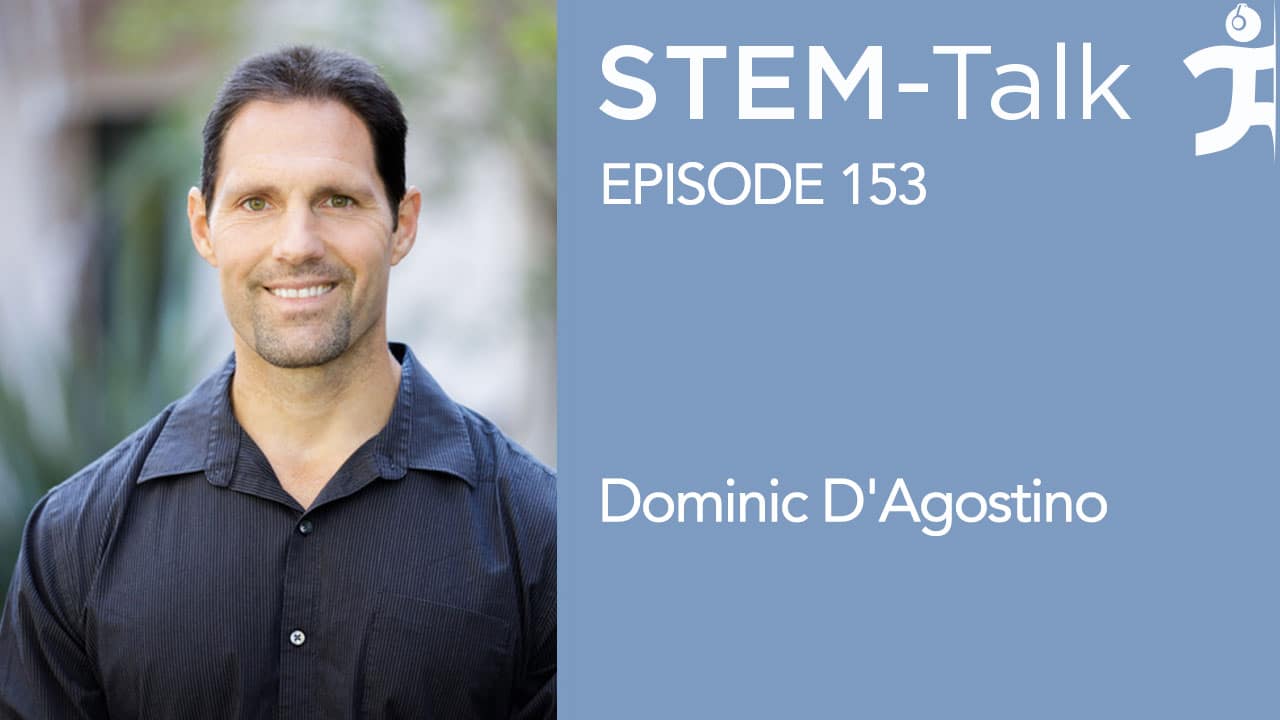STEM-Talk
Episode 153: Dominic D’Agostino discusses new advances in the study of nutritional ketosis
// Jun 8, 2023

Today we have our good friend and colleague Dr. Dominic D’Agostino returning for his third appearance on STEM-Talk. Dom, as most of our longtime listeners know, is well-known for his research into the ketogenic diet and the physiological benefits of nutritional ketosis. Since our last conversation with Dom in 2019, a tremendous body of research has been added to the literature about the therapeutic potential of ketosis. The high-fat, low-carb ketogenic diet has been linked to advances in the treatment of Alzheimer’s, cancer, migraines, type-2 diabetes, psoriasis, sleep apnea, psychiatric disorders, traumatic brain injuries as well as a host of other diseases and disorders, which we cover in today’s interview.
In episode 14 of STEM-Talk, we talked to Dom about his development and testing of metabolic therapies involving the ketogenic diet for a wide range of diseases and conditions. In episode 87, Dom returned to reflect on his 10 years of research focused on the high-fat/low-carbohydrate diet.
In today’s interview, we talk to Dom about this latest work as well as his extensive research on hyperbaric oxygen. Dom is a tenured Associate Professor in the Department of Molecular Pharmacology and Physiology at the University of South Florida Morsani. He specializes in neuroscience, molecular pharmacology, nutrition, and physiology. Dom also is our colleague and a research scientist here at the IHMC.
Show notes
[00:02:50] Dawn opens the interview mentioning Dom’s recent IHMC Evening Lecture, in which he mentions the film “First Do No Harm” starring Meryl Streep. The film is based on the true story of a four-year-old boy diagnosed with severe epilepsy, whose extreme seizures continued despite extensive medical treatments. The boy’s mother reached to Dr. John Freeman, a physician who had successfully treated patients with a ketogenic diet. Dawn asks Dom to give some context about this fictional film based on a true story.
[00:05:05] Dawn asks Dom to discuss the many evidence-based applications of the ketogenic diet that he highlighted in his IHMC evening lecture. [00:07:11] Ken asks Dom about another story involving Russell Winwood, a man with severe chronic obstructive pulmonary disease, also known as COPD. Russell reached out to Dom with respect to treating his COPD with a ketogenic diet. [00:11:21] Ken asks if Russell only engaged in the ketogenic diet or if also used exogenous ketones. [00:12:10] Ken mentions that the ketogenic diet has the broad potential to be an anti-inflammatory diet. Ken goes on to mention that COPD is an inflammatory disease. As Dom’s case report suggested, Ken wonders if the ketogenic diet has the potential to have strong therapeutic effects for other inflammatory conditions as well. Ken asks what other conditions Dom thinks might benefit from therapeutic ketosis. [00:14:02] Dawn mentions that Dom has been busy since his last appearance on STEM-Talk, having authored or collaborated on more than 40 papers, one of which garnered a lot of attention and was published in Frontiers in Neuroscience. This paper investigated whether therapeutic ketosis via ketone esters could represent a viable way to treat epilepsy and other seizure disorders. Dawn asks Dom to elaborate on this paper’s findings and their significance. [00:16:26] Ken mentions that those listeners who are unfamiliar with ketone esters may want to check out our interview with Dr. Brianna Stubbs. Ken asks Dom to give a quick primer on ketone esters and why so many researchers in the field are excited about their potential. [00:19:20] Ken mentions that in addition to ketone salts and ketone esters, there are other product formulations out now, like the one from a company called Kenetik. Ken asks Dom what he thinks about this formulation. [00:23:33] Dawn mentions that Dom has had a number of animal studies published since 2019 looking at ketone induced neuroprotection and asks Dom to give an overview of some of this work. [00:25:57] Dawn asks Dom about his research on Angelman Syndrome, which is a rare genetic and neurological disorder that causes seizures, developmental delay, loss of body movements, and lack of speech. Dawn mentions that Dom was a part of a mouse study that explored whether ketone supplementation could mimic the ketogenic diet as an anticonvulsant, as well as the effects of ketone esters on behavioral and metabolic outcomes. The results of this study were promising, and Dawn asks Dom to talk about some of the key takeaways. [00:29:37] Ken mentions that it makes sense that the ketogenic diet would elevate NAD (nicotinamide adenine dinucleotide) levels. Ken asks Dom whether this same effect is observed with exogenous ketones. [00:30:32] Ken mentions that in the last decade there have been numerous human studies that have investigated the therapeutic role of ketogenic diets in various neurological disorders, with recent work looking into the potential therapeutic effects of ketosis on Alzheimer’s disease. Ken asks Dom to touch on some of this research, and also mentions that episode 59 of STEM-Talk with Steven Cunnane focused a good bit on Alzheimer’s in the context of exogenous ketones. [00:35:02] Dawn mentions that Dom was part of two studies that examined the effects of a ketogenic diet on athletic performance. Dawn goes on to explain that high-carbohydrate, low-fat diets have been the standard for athletes for years, but recent research has challenged the superiority of carb loading. Dawn mentions that former IHMC colleague Dr. Andrew Koutnik published a study that had middle aged athletes undergo two different 31-day isocaloric diets, one which was high carb, and the other ketogenic. Dawn explains that both Dom and Jeff Volek participated in this study and asks Dom what the key takeaways were. [00:37:46] Ken explains that Dom and Jeff Volek also collaborated with Andrew Koutnik on another study on the crossover effect. Before diving into that study specifically, Ken asks Dom to explain what the crossover effect is. [00:40:13] Dawn mentions that Dom has been a part of many studies that have demonstrated the positive impact of a ketogenic diet, but addressing the elephant in the room, Dawn asks Dom what his thoughts are on the fact that some individuals respond to the ketogenic diet by developing a marked elevation of LDL cholesterol on the ketogenic diet, otherwise known as the lean mass hyper-responder phenotype. Dawn specifically asks Dom about an article he and other researchers published in the Journal of Clinical Lipidology on this topic, titled “Elevated LDL-cholesterol levels among lean mass hyper-responders on low-carbohydrate ketogenic diets deserve urgent clinical attention and further research.” [00:45:16] Dawn explains that there is no one-size fits all diet, with some people breezing through a ketogenic diet and others who do not tolerate it as well. She mentions that Dom had a review published a few years ago that examined genetic and other markers in an effort to identify how people might respond to a ketogenic diet, the goal being to identify individuals who were most likely to benefit from a ketogenic diet, and pinpoint individuals who might be at risk of adverse health outcomes because of the diet. Dawn asks Dom to walk through this review and explain its findings. [00:50:03] Ken mentions that Dom has done a lot of research on hyperbaric oxygen, which is a well-established treatment for decompression sickness, which is a risk among divers. Ken goes on to explain that hyperbaric oxygen therapy is now being used to treat several medical conditions including traumatic brain injury. There is controversy, however, regarding this therapy. Ken asks Dom to give a short primer on hyperbaric oxygen and why it has lately attracted so much attention. [00:52:56] Dawn follows up by jumping into a discussion about the NASA project NEEMO that sends crews of astronauts, aquanauts, engineers, and scientists to live in a facility at the bottom of the Atlantic, known as Aquarius. It is the world’s only undersea research station. Dawn explains that NEEMO provides a good analog for space exploration, by mimicking the high physiological stress environment that astronauts experience during space missions. Dawn explains that she was on the crew of NEEMO 21 and Dom was on the crew of NEEMO 22, and Dom’s wife was a NEEMO support diver during NEEMO 22. She later became a part of the all-women crew in NEEMO 23. Dawn asks Dom to talk about his experience on NEEMO as well as the research he conducted. [00:57:58] Dawn asks about Dom’s paper he published after his experience on NEEMO, titled “Human Adaptations to Multiday Saturation on NASA NEEMO,” which explored the physical and psychological effects of living in a multiday hyperbaric environment. Dawn asks Dom to discuss this paper’s findings and its significance. [01:04:25] Ken mentions that Dom and his wife have moved to a farm and asks what life on the farm is like.Links:






